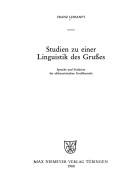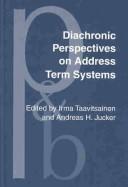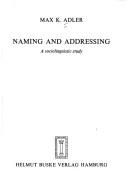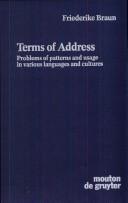| Listing 1 - 10 of 16 | << page >> |
Sort by
|

ISBN: 3484522178 311094300X 9783484522176 Year: 1988 Volume: 217 Publisher: Tübingen: Niemeyer,
Abstract | Keywords | Export | Availability | Bookmark
 Loading...
Loading...Choose an application
- Reference Manager
- EndNote
- RefWorks (Direct export to RefWorks)
Keine ausführliche Beschreibung für "Studien zu einer Linguistik des Grußes" verfügbar.
Salutations in literature. --- 804.0-022 --- -Salutations --- -Salutations in literature --- Greetings --- Oudfrans --- 804.0-022 Oudfrans --- Civilisation médiévale dans la littérature --- 800:316 --- French language --- -French literature --- Civilization, Medieval, in literature --- Langue d'oïl --- 800:316 Sociolinguistiek --- Sociolinguistiek --- Terms and phrases --- History and criticism --- History --- French literature --- Salutations in literature --- Salutations --- Etiquette --- Manners and customs --- Romance languages --- Old French language --- Pragmatics --- Civilization, Medieval, in literature. --- Terms and phrases. --- History and criticism. --- History. --- Littérature française --- Histoire et critique --- To 1500 --- France --- Language --- French language - To 1500 - Terms and phrases. --- French literature - To 1500 - History and criticism. --- Salutations - France - History.
Book
ISBN: 0521292506 9780521292504 Year: 1986 Volume: 8 Publisher: Ann Arbor (Mich.) : University microfilms international,
Abstract | Keywords | Export | Availability | Bookmark
 Loading...
Loading...Choose an application
- Reference Manager
- EndNote
- RefWorks (Direct export to RefWorks)
159.923.33*1 --- 159.923.33*1 Communicatie. Relatie --- Communicatie. Relatie --- Sociolinguistics --- Pragmatics --- Interaction sociale --- Salutations --- Question (logique) --- Pragmatique --- Grammar, Comparative and general --- Social interaction --- Sociolinguistics. --- Speech acts (Linguistics) --- Honorific --- Interrogative --- Pragmatique. --- Interaction sociale. --- Salutations.
Book
ISBN: 3893252339 Year: 1994 Publisher: Münster Waxmann
Abstract | Keywords | Export | Availability | Bookmark
 Loading...
Loading...Choose an application
- Reference Manager
- EndNote
- RefWorks (Direct export to RefWorks)
Salutations --- Table etiquette --- Dining etiquette --- Dining room etiquette --- Restaurant etiquette --- Etiquette --- Greetings --- Manners and customs --- Germany --- Social life and customs. --- Folklore --- History of civilization
Book
ISBN: 9780521870627 0521870623 9780511576690 9780521182379 9780511518058 0511518056 0511576692 1107197562 1282104004 9786612104008 0511517564 0511515707 0511514514 0511516983 0521182379 Year: 2009 Publisher: Cambridge, UK ; New York : Cambridge University Press,
Abstract | Keywords | Export | Availability | Bookmark
 Loading...
Loading...Choose an application
- Reference Manager
- EndNote
- RefWorks (Direct export to RefWorks)
The way in which people address one another is crucial to expressing social relationships and is closely linked with cultural values. In English we call some people by their first names, and others 'Mr' or 'Ms', followed by their surname. In some other languages there are different ways of saying 'you' depending on the degree of social distance. Exploring practices in the family, school, university, the workplace and in letters, this book reveals patterns in the varied ways people choose to address one another, from pronouns to first names, from honorifics to titles and last names. Examples are taken from contemporary English, French, German and Swedish, using rich data from focus group research, interviews, chat groups, and participant observation.
Grammar --- Sociolinguistics --- Forms of address. --- Politeness (Linguistics) --- Grammar, Comparative and general --- Honorific. --- Pronoun. --- Politeness (Linguistics). --- Pronouns --- Honorific --- Courtesy (Linguistics) --- Linguistics --- Address, Forms of --- Address, Titles of --- Titles of address --- Letter writing --- Salutations --- Titles of honor and nobility --- Function words --- Nominals --- Reflexives --- Polite form --- Arts and Humanities --- Language & Linguistics --- Philology --- Grammar, Comparative and general Honorific --- Formes allocutoires --- Énonciation (linguistique) --- Pragmatique --- Grammaire comparée --- Pronoms --- Énonciation (linguistique) --- Grammaire comparée

ISBN: 0415007615 9780415007610 Year: 1990 Publisher: London: Routledge,
Abstract | Keywords | Export | Availability | Bookmark
 Loading...
Loading...Choose an application
- Reference Manager
- EndNote
- RefWorks (Direct export to RefWorks)
Lexicology. Semantics --- English language --- Forms of address --- Anglais (Langue) --- Titres de politesse --- Address, Forms of --- Dictionaries --- Etymology --- Names --- Dictionnaires --- Etymologie --- Noms --- -English language --- -Forms of address --- -Address, Forms of --- Address, Titles of --- Titles of address --- Letter writing --- Salutations --- Titles of honor and nobility --- Germanic languages --- -Dictionaries --- -Names --- Bijnamen --- Titulatuur --- Dictionaries. --- woordenboeken --- Germanic languagesAddress, Forms of --- woordenboeken. --- Woordenboeken. --- Address, Forms of&delete& --- Etymology&delete& --- Names&delete& --- English language - Address, Forms of - Dictionaries --- English language - Etymology - Names - Dictionaries --- Forms of address - Dictionaries

ISBN: 902725348X 1588113108 9781588113108 1282255428 9027296677 1423766504 9786612255427 9781423766506 9789027253484 Year: 2002 Publisher: Philadelphia : J. Benjamins,
Abstract | Keywords | Export | Availability | Bookmark
 Loading...
Loading...Choose an application
- Reference Manager
- EndNote
- RefWorks (Direct export to RefWorks)
Address term systems and their diachronic developments are discussed in a wide range of European languages in this volume. Most chapters focus on pronominal systems, and in particular on the criteria that govern the choices between a more intimate and a more distant or polite pronoun, as for instance thou and you in Early Modern English, vos and vuestra merced in sixteenth century Spanish or du and Sie in Modern German. Several contributions deal with situations in which more than two terms can be used and several also note co-occurrence patterns of pronominal and nominal forms of address. The volume provides a multivaried picture of the evolutionary lines of address term systems and a representative range of current approaches from pragmatics and sociolinguistics to conversation analysis. It is thus a timely contribution to the rapidly expanding field of historical pragmatics.
Historical linguistics --- Pragmatics --- 800 <09> --- 800 <09> Taalwetenschap. Taalkunde. Linguistiek--Geschiedenis van ... --- Taalwetenschap. Taalkunde. Linguistiek--Geschiedenis van ... --- Forms of address --- Diachronic linguistics --- Dynamic linguistics --- Evolutionary linguistics --- Language and languages --- Language and history --- Linguistics --- Address, Forms of --- Address, Titles of --- Titles of address --- Letter writing --- Salutations --- Titles of honor and nobility --- Taalwetenschap. Taalkunde. Linguistiek--Geschiedenis van .. --- History --- Taalwetenschap. Taalkunde. Linguistiek--Geschiedenis van --- Forms of address. --- Historical linguistics. --- Linguistique historique --- Énonciation (linguistique) --- Formes allocutoires --- Énonciation (linguistique)
Book
ISBN: 2802710745 9782802710745 Year: 1997 Publisher: Bruxelles: Bruylant,
Abstract | Keywords | Export | Availability | Bookmark
 Loading...
Loading...Choose an application
- Reference Manager
- EndNote
- RefWorks (Direct export to RefWorks)
Private law --- Belgium --- France --- Nobility --- Heraldry --- Noblesse --- Héraldique --- Law and legislation --- Droit --- Titles of honor and nobility --- Legal status, laws, etc. --- History --- -Nobility --- -Titles of honor and nobility --- -#A9808A --- Address, Titles of --- Honorary titles --- Titles of address --- Salutations --- Noble class --- Noble families --- Nobles (Social class) --- Peerage --- Upper class --- Aristocracy (Social class) --- Legal status, laws, etc --- -History --- Héraldique --- #A9808A --- Law and legislation&delete& --- Nobility - Legal status, laws, etc. - France - History --- Titles of honor and nobility - Law and legislation - France - History --- Nobility - Legal status, laws, etc. - Belgium - History --- Titles of honor and nobility - Law and legislation - Belgium - History --- FRANCE --- BELGIQUE --- NOBLESSE

ISBN: 3871183326 9783871183324 Year: 1978 Publisher: Hamburg Buske
Abstract | Keywords | Export | Availability | Bookmark
 Loading...
Loading...Choose an application
- Reference Manager
- EndNote
- RefWorks (Direct export to RefWorks)
Sociolinguistics --- 316:800 --- Names, Personal --- Forms of address --- Magic --- Taboo, Linguistic --- Euphemism --- Figures of speech --- Semantics --- Linguistic taboo --- Ineffable, The --- Taboo --- Magick --- Necromancy --- Sorcery --- Spells --- Occultism --- Address, Forms of --- Address, Titles of --- Titles of address --- Letter writing --- Salutations --- Titles of honor and nobility --- Anthroponomy --- Baby names --- Christian names --- Family names --- Forenames --- Names of families --- Names of persons --- Personal names --- Surnames --- Names --- Onomastics --- Language and languages --- Language and society --- Society and language --- Sociology of language --- Language and culture --- Linguistics --- Sociology --- Integrational linguistics (Oxford school) --- Sociolinguistiek --- Social aspects --- Sociological aspects --- Sociolinguistics. --- Names, Personal. --- Forms of address. --- Magic. --- Taboo, Linguistic. --- Euphemism. --- 316:800 Sociolinguistiek

ISBN: 0899254322 3110115484 3110848112 Year: 1988 Volume: vol 50 Publisher: Berlin New York Amsterdam Mouton de Gruyter
Abstract | Keywords | Export | Availability | Bookmark
 Loading...
Loading...Choose an application
- Reference Manager
- EndNote
- RefWorks (Direct export to RefWorks)
Sociolinguistics --- Pragmatics --- Address [Form of ] --- Forms of address --- Langage -- Aspects sociaux --- Langage -- Sociologie --- Langage et société --- Language and languages -- Social aspects --- Language and languages -- Sociological aspects --- Language and society --- Langues -- Aspects sociaux --- Langues -- Sociologie --- Society and language --- Sociolinguistique --- Sociolinguïstiek --- Sociologie des langues --- Sociologie du langage --- Sociology of language --- Société et langage --- Titels en aanspreekvormen --- Titres et pronoms appellatifs --- 800:316 --- 316:800 --- #SBIB:309H518 --- Sociolinguistiek --- Verbale communicatie: sociologie, antropologie, sociolinguistiek --- 316:800 Sociolinguistiek --- 800:316 Sociolinguistiek --- Forms of address. --- Sociolinguistics. --- Language and languages --- Language and culture --- Linguistics --- Sociology --- Integrational linguistics (Oxford school) --- Address, Forms of --- Address, Titles of --- Titles of address --- Letter writing --- Salutations --- Titles of honor and nobility --- Social aspects --- Sociological aspects

ISBN: 0883770601 9780883770603 Year: 1976 Publisher: Rowley (Mass.): Newbury house,
Abstract | Keywords | Export | Availability | Bookmark
 Loading...
Loading...Choose an application
- Reference Manager
- EndNote
- RefWorks (Direct export to RefWorks)
French language --- Psycholinguistics --- Spanish language --- Grammar --- Sociolinguistics --- Forms of address --- Interpersonal communication --- Speech and social status --- Social classes and language --- Social classes and speech --- Social status and language --- Social status and speech --- Speech and social classes --- Social status --- Communication --- Interpersonal relations --- Address, Forms of --- Address, Titles of --- Titles of address --- Letter writing --- Salutations --- Titles of honor and nobility --- Language and languages --- Language and society --- Society and language --- Sociology of language --- Language and culture --- Linguistics --- Sociology --- Integrational linguistics (Oxford school) --- Social aspects --- Sociological aspects --- Sociolinguistics. --- Forms of address. --- Interpersonal communication. --- Speech and social status.
| Listing 1 - 10 of 16 | << page >> |
Sort by
|

 Search
Search Feedback
Feedback About UniCat
About UniCat  Help
Help News
News